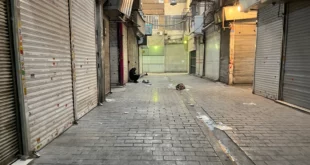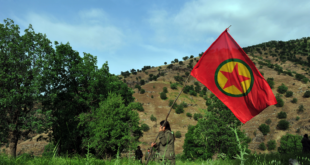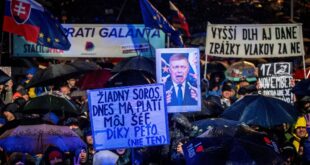NAZRAN, Russia (Reuters) – Russia thought it had tamed the Muslim regions on its southern flank when it quelled a rebellion in Chechnya, but trouble is brewing again.
Barely noticed by the outside world, increasing violence and clashes between federal forces and rebels in Ingushetia, just west of Chechnya, threaten to destabilize the north Caucasus.
Ninety-three people were killed in clashes in the year to the end of August, the local branch of human rights group Memorial says — a big death toll for a region with a population of only 470,000.
Gunshots ring out at night in Nazran, the biggest town, and bomb attacks, murders and kidnappings are part of daily life.
In a busy public building, a policeman waited until his colleague was out of earshot before giving his views on what was happening in the region.
“The presidency doesn’t work, the ministries don’t work and the government doesn’t work,” he said, speaking softly.
“There were more dead yesterday. What will happen today?” Three men had been killed by unknown gunmen and two soldiers wounded by a grenade attack on the interior ministry.
Russian officials blame the violence on groups of armed men, many driven by Islamist ideas, who they say have tried to overthrow Moscow’s rule since 2002.
Many local people, along with human rights groups, say heavy-handed tactics by the security forces have combined with frustration over poverty and official corruption to create a popular uprising.
The region, wedged between Chechnya and North Ossetia, is one of Russia’s poorest, with unemployment estimated at about 75 percent.
“Really what we have in Ingushetia is a civil war,” said Alexei Malashenko, an analyst at the Carnegie Moscow Center.
Much of the anger is directed against Murat Zyazikov, the former KGB officer who was elected president of Ingushetia in 2002 and is backed by the Kremlin.
“There weren’t any rebels in Ingushetia in 2002. Now it’s getting worse and worse,” said Timur Akiyev, the local director of Russian human rights group Memorial.
On his desk lay a pile of photocopied photos of more than 200 men who have disappeared in the region since 2002.
Rights groups blame security forces and say such methods drive young men to take up arms.
“Ingushetia is virtually out of control,” Akiyev said.
“OUTSIDE FORCES”
Yuri Turygin, Ingushetia’s chief prosecutor, said the authorities had no choice but to mount security operations to neutralize the insurgents.
“The rebels were living here in camps and nobody touched them,” said Turygin, whose office is guarded by two heavily-armed soldiers and who has a picture of Prime Minister Vladimir Putin as the screensaver on his mobile telephone.
“Now, if we close our eyes to this we will have an even bigger problem.”
Zyazikov agreed to be interviewed but his spokesman later said he was unavailable. In the past he has blamed the violence on outside forces seeking to undermine Russia.
It is more than a local problem. As with two rounds of conflict in Chechnya, which killed tens of thousands of people from 1994 and spilled over to neighboring regions, the clashes in Ingushetia could spread to other parts of the North Caucasus.
They could also re-ignite an ethnic conflict with the neighboring Christian region of North Ossetia in which more than 500 people were killed in 1992.
“The situation could become more dangerous because of Ossetia,” Malashenko at the Carnegie Moscow Center said. “All this anger is directed against Zyazikov but it could easily be directed against the Ossetians.
Ingushetia’s opposition politicians have distanced themselves from the rebels and say they will focus on street protests to try to force Zyazikov to resign.
Late last month Ingushetia’s most prominent opposition figure, Magomed Yevloyev, was found dumped outside a hospital dying from a gunshot to the head. Prosecutors said a policeman shot him by accident when Yevloyev tried to grab his gun.
The European Union called for an explanation, a further thorn in Russia’s side after EU criticism of Moscow’s intervention in Georgia in August over breakaway South Ossetia.
Analysts say Russia’s subsequent recognition of the Georgian region could encourage rebels in places like Ingushetia, making it harder for Moscow to maintain control.
When the Reuters car left the home of a local opposition leader in Nazran, a car with blacked-out windows followed through Nazran’s litter strewn streets.
At the airport — where gunmen dozed in chairs and an English “Tourist Information” sign adorned an abandoned booth — security agents asked aggressive questions and searched pockets, equipment and bags.
The policeman who had expressed his dislike for the authorities said he had to earn a living.
“What choice do we have? Join the police or run away to the forests,” he said, referring the tree-lined hills of the Caucasus mountains where the rebel gunmen hide out.
Nazran’s covered market lies not far from a vodka shop firebombed by rebels. The stalls were piled high with fruit but there were no customers.
“People are scared,” said a woman wearing a headscarf running a row of stalls.
“Three people died last night. I will go home from work tonight but I am not sure that I will be back.”
 Eurasia Press & News
Eurasia Press & News



